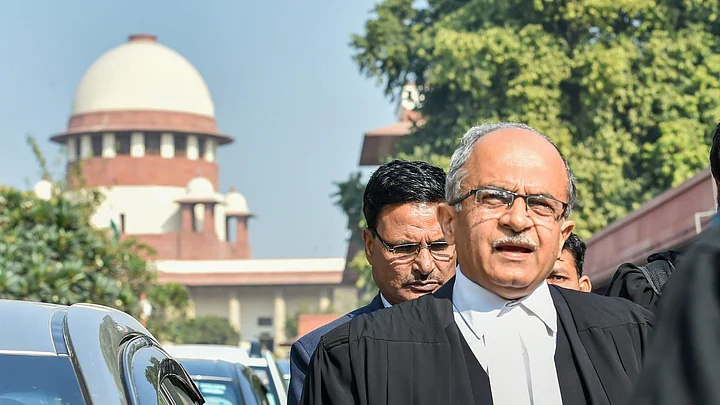The Supreme Court on Monday, 10 August, announced that it would conduct hearings in a 2009 contempt case against lawyer-activist Prashant Bhushan from 17 August onwards.
A bench of Justices Arun Mishra, BR Gavai, and Krishna Murari stated that the case needed to be heard on merits, with the court to decide whether statements alleging that judges are corrupt amounted to contempt of court per se.
In doing so, the bench has evidently held that it does not accept the explanation provided by Bhushan to the court for his statement to Tehelka magazine back in 2009, that eight out of the last 16 Chief Justices of India (from that time) were corrupt.
On 4 August, the judges had conducted a private hearing with Bhushan’s lawyer, senior advocate Rajeev Dhavan after switching off all microphones and cameras from the video conference hearing. Following this, they had said they would await an explanation or apology from the anti-corruption crusader.
“In case we do not accept the explanation/apology, we will hear the matter,” the judges had written while reserving their order.
Bhushan submitted an explanation on the day, although he refused to apologise to the court for the statement. His office put out a press release which stated that the following explanation had been provided to the court for his statement:
“In my interview to Tehelka in 2009 I have used the word corruption in a wide sense meaning lack of propriety. I did not mean only financial corruption or deriving any pecuniary advantage. If what I have said caused hurt to any of them or to their families in any way, I regret the same. I unreservedly state that I support the institution of the judiciary and especially the Supreme Court of which I am a part, and had no intention to lower the prestige of the judiciary in which I have complete faith. I regret if my interview was misunderstood as doing so, that is, lower the reputation of the judiciary, especially the Supreme Court, which could never have been my intention at all.”
WHAT IS THIS CASE ABOUT?
This case was filed in 2009 on a complaint by senior advocate Harish Salve, who was back then appearing as an amicus curiae in a PIL before the Supreme Court.
Salve informed the court of an interview given by Bhushan to Tehelka. In the interview, Bhushan had made allegations of corruption against judges of the apex court.
A Supreme Court order from the time describes the allegations as follows:
“The learned Amicus Curiae drew the attention of the Court to certain statements which had been made by the Respondent No.1 in an interview given to Ms. Shoma Chaudhury, wherein various statements were made alleging corruption in the judiciary and, in particular, the higher judiciary, without any material in support thereof. In the interview he went on to say that although he did not have any proof for his allegations, half of the last 16 Chief Justices were corrupt. He also made a serious imputation against the Hon’ble the Chief Justice of India, Justice SH Kapadia, as His Lordship then was, alleging misdemeanor with regard to the hearing of a matter involving a company known as Sterlite, in which Justice Kapadia had certain shares, deliberately omitting to mention that the said fact had been made known to the counsel appearing in the matter, who had categorically stated that they had no objection whatsoever to the matter being heard by His Lordship.”
Bhushan, represented by famous lawyer Ram Jethmalani at that time, had tried to object to the maintainability of the case, saying his statements did not amount to contempt of court. However, the court decided that the case should proceed.
Jethmalani then argued that a larger bench of five judges or more was needed to hear the case as it involves issues of constitutional importance, relating to the right to freedom of speech. Bhushan's father, the veteran lawyer and former Law Minister Shanti Bhushan, subsequently filed an affidavit in the court stating he held the same opinion as his son, that eight of the last 16 CJIs (at the time) had been corrupt.
No substantive hearings had been held in the case since 2012, before it was suddenly listed on 24 July.
This happened on the same day the Supreme Court took up a separate suo motu contempt case against Bhushan for tweets put out by him on 27 and 29 June 2020 – also being heard by the same three judges.
Bhushan filed a detailed affidavit in that case, explaining why he had commented on current CJI SA Bobde’s photo on a superbike, and why he had a bona fide opinion that the Supreme Court (particularly the last 4 CJIs) had played a role in the destruction of democracy in India.
Bhushan’s lawyer in that case, senior advocate Dushyant Dave, gave a fiery performance during a hearing on 5 August defending his client, following which the judges reserved their order.
